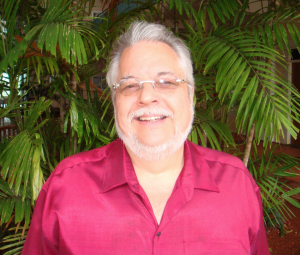 This post is the transcript of an electronic interview between D. S. Farrer and James D. Sellmann. Farrer is the special issue editor for Social Analysis Volume 58, Issue 1, and Sellmann is the co-author of the article “Chants of Re-enchantment: Chamorro Spiritual Resistance to Colonial Domination“ appearing in that issue. Below, Sellmann answers a series of questions related to his article in Social Analysis.
This post is the transcript of an electronic interview between D. S. Farrer and James D. Sellmann. Farrer is the special issue editor for Social Analysis Volume 58, Issue 1, and Sellmann is the co-author of the article “Chants of Re-enchantment: Chamorro Spiritual Resistance to Colonial Domination“ appearing in that issue. Below, Sellmann answers a series of questions related to his article in Social Analysis.
This is the fifth in a series of interviews with contributors to this volume. Find the previous contributions on our blog.
What drew you to the study of War Magic & Warrior Religion?
I have been interested in what religion is and how it functions since my childhood. I’ve often wondered about the relations between magic and religion and the role that magic-religion plays in both love and war.
Did any perceptions on the subject change from the time you started your research/compiled the contributions to the time you completed the volume?
I thought magic-religion is a complex matter and that was further confirmed by my studies.
What aspect of researching and writing the chapter did you find most challenging? Most rewarding?
It is always a challenge to attempt to enter the cultural world of another people. The reward comes when a person from that culture says they read the work and we got it right.
To what extent do you think the book will contribute to debates among current and future academics within the field?
Personally I believe that the war magic volume contributes a good deal of debate and interest among academics because it uncovers new perspectives on the role of magic-religion in warfare. Usually war is considered a secular phenomenon. This work breaks away from that common understanding and brings the role of religion into the foreground.
Do you think there are aspects of this work that will be controversial to other scholars working in the field?
Yes because as noted above this work highlights the importance of religion in warfare.
If you weren’t an anthropologist, historian, what would you have done instead?
I was training to become a clinical psychologist when comparative or cross-cultural philosophy caught my attention.
What’s a talent or hobby you have that your colleagues would be surprised to learn about?
None.
What inspired your love of the subject of War Magic? When?
The complexities of human behavior and how humans are so easily drawn into violence on both individual and community levels inspired me to study war and war magic.
What inspired you to research and write?
Ignorance. All my life I felt that I did not know enough about the world and myself. So I became an academic because I’ve had a life-long desire to know more.
What is one particular area of interest or question, that hasn’t necessarily been the focus of much attention, which you feel is especially pertinent to your field today and in the future?
Non-dual or correlative thinking and how it differs from two-valued (true/false) logic.
James D. Sellmann received a PhD in Chinese philosophy in 1990 and an MA in philosophy in 1983 from the University of Hawai‘i. He is the Dean of the College of Liberal Arts and Social Sciences and a Professor of Philosophy and Micronesian Studies at the University of Guam. He has authored Timing and Rulership in Master Lu’s Spring and Autumn Annals (2002) and over 60 academic articles, book chapters, and encyclopedia entries, having published in peer-reviewed journals, such as Asian Philosophy and Philosophy East and West.

